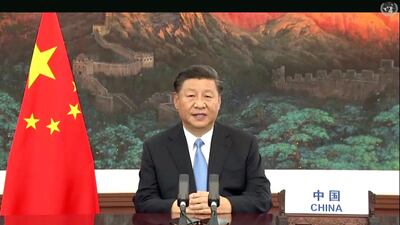UN Secretary General Antonio Guterres began his annual gathering of world leaders with a call for global solidarity on Tuesday.
But it was only minutes before talks descended into name-calling and veiled criticism by the US, China and other powers.
Mr Guterres wanted this year's meeting of presidents and prime ministers, which is being held online for the first time because of the Covid-19 outbreak, to celebrate the world body's 75th birthday with co-operation against the pandemic and support for global ceasefires.
But any camaraderie quickly evaporated as leaders used their recorded video speeches to promote success and bash rivals, clashing on matters from coronavirus to US-China ties, the fraying Iran nuclear deal and Palestinian-Israeli tensions.
Leading that charge was US President Donald Trump, whose uncharacteristically brief, seven-minute address blasted Beijing for matters including the pandemic and tipping millions of tonnes of "plastic and trash" into the world's oceans.
Beijing must be held accountable for letting the "China virus" spread from the city of Wuhan last year to beyond its borders, Mr Trump said.
He criticised Beijing for overfishing in "other countries' waters", destroying large areas of coral reef, releasing "toxic mercury", trapping gases in the air and for decades of "trade abuses" that hurt ordinary Americans.
In his speech, Chinese President Xi Jinping did not name the US, but offered a veiled swipe at Washington’s decision to leave the 2015 Paris climate change accord, saying leaders should honour the deal.
Mr Xi also warned against “politicising” or “stigmatisation” of countries over Covid-19.
In the face of Mr Trump’s trade war, Mr Xi spoke against unilateralism and protectionism that undermined “global industrial and supply chains”.
Other rows touched on the Middle East.
In his only reference to Iran, Mr Trump called it a “state sponsor of terror”.
He did not threaten sanctions on nations that disagreed with the White House over the 2015 Iran nuclear deal, as some people predicted.
Iran's President Hassan Rouhani claimed the US was an "interventionist" and "bullying" power that victimised his country with the "harshest sanctions" and killed its "hero", general Qassem Suleimani, in a US drone strike in January.
Washington and Tehran have sparred for decades, but tension increased sharply in 2018 when Mr Trump pulled the US out of the 2015 nuclear deal with Iran.
He also put US sanctions on Tehran and this month tried to reimpose universal UN sanctions on the country.
On this point, French President Emmanuel Macron joined the row, saying America's "maximum pressure" campaign against Tehran was not working.
Mr Macron's comments show that even long-standing Nato allies France and the US were at odds.
While Mr Trump touted his "ground-breaking peace deals" between the UAE, Bahrain and Israel, Turkish President Recep Tayyip Erdogan warned against a "one-sided and unjust" deal that did not secure an independent state for Palestinians.
World leaders also tackled religious prejudice.
Mr Erdogan’s suggestion that Muslims were the world’s “most exposed” faith was countered by Brazilian President Jair Bolsonaro, who said “Christophobia”, not Islamophobia, was the real danger.
Mr Bolsonaro also railed against a "brutal disinformation" campaign that tarnished Brazil's record for protecting the Amazon rainforest from fires and cash-cropping.
Filipino leader Rodrigo Duterte, who has been criticised by the UN and rights groups over campaigns against drug dealers, said human rights reports were being used as weapons to discredit his government.
But it was not all doom and gloom.
In his comments to mark the UN's 75th anniversary on Monday, Mr Guterres reminded members that the world body had largely succeeded in the job for which it was built after the Second World War – stopping conflicts between major powers.
Meanwhile, Russian President Vladimir Putin offered to share Moscow’s expertise from developing a vaccine against Covid-19 and to hold a global conference on the topic.
And Mr Xi added $50 million (Dh183.6m) to UN aid projects for victims of the pandemic.
Richard Gowan, a UN analyst at the International Crisis Group think tank, said Russia and China were trying to score political points after Mr Trump’s decisions to abandon UN bodies such as the World Health Organisation, international deals on Iran and climate change.
"Xi and Putin had lots of coded rebukes for the US, but both chose to take the high road and pose as guardians of the UN system," Mr Gowan told The National.
“China and the US still co-operate on some big issues, like North Korean sanctions through the UN.
"But they are locked in a pretty serious fight over the origins of the coronavirus and neither is willing to back down.”
The UN's annual gathering usually brings dozens of leaders and their vast entourages to New York City.
It was scaled back this year because of a pandemic that has ravaged the city.
Only mask-wearing ambassadors of the UN's 193 members sit in the General Assembly hall, watching recorded videos that are streamed online.
























